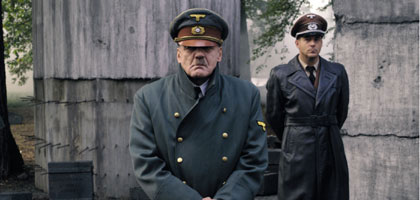
Downfall
Germany/Austria/Italy 2004

Reviewed by Richard Falcon
Synopsis
Our synopses give away the plot in full, including surprise twists.
East Prussia, 1942. Twenty-two-year-old Traudl Junge (Alexandra Maria Lara) is interviewed to be Adolf Hitler's personal secretary. Her dictation is awful but Hitler (Bruno Ganz) chooses her as she is from Munich, young and pretty.
Berlin, 20 April 1945. Traudl wakes up in the bunker below the Reichskanzlei to the boom of approaching Soviet artillery fire. It is Hitler's birthday and the Red Army is within 12 kilometres of the city centre. Albert Speer encourages Hitler to stay on the stage until the curtain closes, but other top Nazis turn to Eva Braun (Juliane Köhler) to persuade Hitler to leave.
Above ground, the Hitler Youth – including 13-year-old Peter (Donevan Gunia) – are fighting on and idealistic SS doctor Schenck (Christian Berkel) wanders amid official detritus, ignoring Himmler's orders to attend a makeshift field hospital outside Berlin. Eva Braun holds a dance to celebrate Hitler's birthday, which is interrupted by an artillery shell. Hitler emerges from the bunker to give medals to Peter and the children. General Mohnke (André Hennicke), who has ordered the western displacement of Hitler's troops, arrives at the bunker expecting to be shot but is charged with defending Berlin.
Hitler is forced to admit the war is over. Traudl decides to stay. Hitler rants about Goering's attempts to take charge and gives Traudl and the other women suicide pills provided by Himmler. Traudl types up Hitler's and then Goebbels' last wills. Speer (Heino Ferch) begs Hitler to surrender, admitting he has been ignoring his orders for months. Hitler and Eva Braun are married in the bunker and Hitler orders his body to be burnt before the Russians arrive. The final days of the Third Reich pass with the guards staying drunk.
30 April 1945. Hitler helps to put down his dog and takes advice on how to kill himself. He shoots himself and Eva while taking the suicide pills, and his body is burnt. Magda Goebbels (Corinna Harfouch) murders her six children in their drugged sleep and her husband shoots her and himself, their bodies too being burnt. Traudl makes it through the Russian lines with young Peter to safety.
Review
The last time an actor playing Adolf Hitler took centre stage in a German film was in Pabst's Der letzte Akt (The Last Act, 1955). Since then something of an informal taboo has been in place: in the 1970s, 'New German Cinema' films tackling the Nazi era – such as Hans Jurgen Syberberg's Hitler, ein Film Aus Deutschland (Our Hitler, 1977) – were typified by a profound sense of intellectual and moral burden, and the screening of the US miniseries Holocaust, which dramatised the Nazi élite, was a national event. To a British audience fresh from the television plays Uncle Adolf and Hitler: The Rise of Evil (in which, respectively, Ken Stott acted out the Führer's relationship with his niece and Robert Carlyle played the young Hitler), Downfall doesn't look much like a transgressive film. But its opening scene, in which a group of young women sit nervously awaiting interviews to become the Führer's personal secretary, offers their anxiety as a mirror of a German audience's frisson of anticipation before the appearance from behind a closed door of Bruno Ganz – now perhaps the most venerable of German-language stars – as the dictator. The material itself is not new, although recent sources add more detail. Pabst's film covering the last days in the Berlin bunker came after the accounts of British historian Hugh Trevor Roper. In 1973, Roper offered a professional historian's factual seal of approval to the pretty dreadful Hitler: The Last Ten Days, a film notable only for the skill with which Alec Guinness impersonated the dictator through the same morbid narrative of ranting despair and suicide offered by Downfall. In 1981, Anthony Hopkins earned an Emmy for The Bunker, a TV movie covering the same ground.
Ganz – predominantly associated with his melancholy angel from Wim Wenders' Wings of Desire – succeeds brilliantly with this gift of a role, haunting the mind for days afterwards with his shuffling, ingratiating Führer, the only element with a resonance beyond limpid historical reconstruction: stricken with Parkinson's disease, screaming at his generals to deploy battalions long since fallen, eating pasta and sorrowfully looking away as his dog Blondi is put down. Having apparently studied the only extant tape of Hitler's normal speaking voice, the actor has the Austrian intonations down pat, but has gone on record as saying that he was happy to be able to interpose his Swiss passport between himself and the role. Ganz playing Hitler has international marquee value – "Bruno Ganz ist Adolf Hitler"boasts the trailer – but its wider meaning remains unexplored by the film. If humanising Hitler is the flavour of the day in British TV fictions as much as in Germany, and has led to reams of press pontificating in Germany, the non-financial purpose of the film remains vague.
If most films tend to collapse under this question, Downfall begs it continually. Based largely on two sources – Inside Hitler's Bunker by historian Joachim Fest and Until the Final Hour by Traudl Junge and Melissa Müller – it vacillates between multiple points of view (notably that of Traudl, Hitler's personal secretary, and an ostensibly innocent witness) and a more problematic omniscient, supposedly 'historical' POV. This allows us to accompany a heroic army doctor through the carnage on the streets above as, MASH-like, he saws through bones and patches together wounded soldiers; child soldiers fighting on the streets and later honoured by Hitler; and a gallery of current German stars strutting their stuff as Nazi bigwigs (including Heino Ferch as a sympathetically portrayed Albert Speer). Junge herself appears at the end of the film in a excerpt from a TV documentary made shortly before her death and tacks on a perspective missing from the body of the film, declaring that youth does not excuse ignorance. In a similar vein, the proposition that Downfall exists to inform a younger generation of historical facts is supported by a welter of publicity which even roped in former Chancellor Helmut Kohl to suggest in the tabloid Bild that it was almost a duty to see the film.
Downfall offers a bewildering checklist of real-life Nazi personnel, sacrificing narrative economy, emotional engagement and authorial perspective in favour of a trainspotter's notion of historical comprehensiveness. Producer Bernd Eichinger (Das Boot) and historian Fest appear more distinctive creative forces here than director Oliver Hirschbiegel (Das Experiment), the film offering Fest's historiography as its main raison d'être once Junge's perspective becomes too limited to carry the narrative.
In a trenchant recent piece in Die Zeit, Wenders expressed his shock at Downfall's wilful avoidance of a coherent perspective, accusing it of Verharmlosung, a specifically German criticism of any trivialisation of the Nazi past, with overtones of political and ethical irresponsibility – a charge he first levelled against Fest in relation to his 1977 documentary Hitler a Career, which started a 'Hitler Wave' in West German cultural life towards the end of that decade. Downfall does indeed trivialise in terms of its literal-minded aesthetic choices, shaking the cinema with artillery bursts and sinking into morbid melodrama when Corinna Harfouch's impassive, Führer-worshipping Magda Goebbels crushes suicide tablets between the teeth of each of her six sleeping children. Identification with these monsters as human beings is the greatest challenge a fiction film on the subject could meet, but Downfall falls short of this, partly because of its habit of hammering home the obvious fact that Germany and Europe were betrayed by these mass murderers; "Now they are having their throats slashed,"a bloodthirsty, cadaverous Goebbels crows of the sufferings of the German people. Lacking any emotional access points beyond morbid curiosity or the desire for an illustrated history lesson, Downfall is ultimately of interest for Ganz's brave, slightly mad performance and its implicit contention, supported by its huge success at the domestic box office, that German commercial film can now treat Hitler like any other historical dictator – like Rod Steiger's Napoleon perhaps, or, more precisely given the film's construction of the Führer's last days, Richard III, whom Ganz evokes most strongly in his final, pseudo-tragic, pseudo-meaningful line: "Tomorrow millions will curse me, but fate wanted it this way."
Credits
- Director
- Oliver Hirschbiegel
- Producer
- Bernd Eichinger
- Screenplay
- Bernd Eichinger
-
Based on the books Der Untergang Hitler und das Ende des Dritten Reichs/Inside Hitler's Bunker The Last Days of the Third Reich by Joachim Fest and Bis zur letzen Stunde (Until the Final Hour) by Traudl Junge and Melissa Müller
- Director of Photography
- Rainer Klausmann
- Editor
- Hans Funck
- Art Director
- Bernd Lepel
- Music/Music Composed and Arranged by
- Stephan Zacharias
